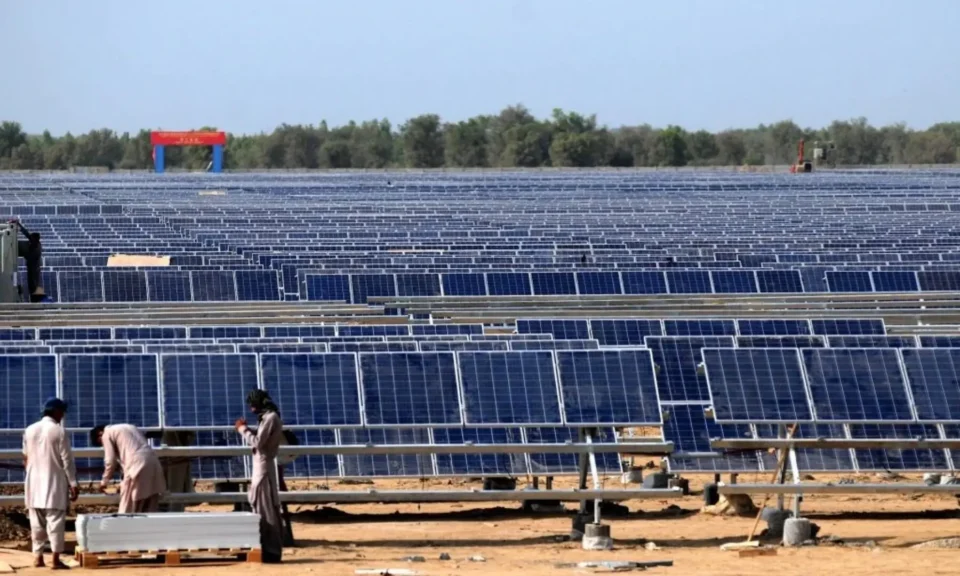Pakistan’s Clean Energy Future: Opportunities and Challenges
In southern Punjab, the roof of Lucky Cement’s factory shines under the summer sun, covered with solar panels. Inside, advanced lithium-ion batteries from China store energy to keep the plant running during the frequent power cuts that affect much of the country.
This example highlights a growing shift in Pakistan’s energy sector. Across major industrial hubs — from Faisalabad’s textile mills to Sindh’s food factories — businesses and households are turning to solar power combined with modern battery storage. The move is being driven by two main factors: rising electricity prices at home and surplus battery production in China that has pushed global prices down.
Why the Shift is Happening
China currently produces more than three-quarters of the world’s batteries. With electric vehicle sales slowing in some global markets, Chinese companies are exporting excess batteries at lower prices. Pakistan, struggling with high electricity costs and regular load shedding, has become an important market for these products.
Imports of lithium batteries into Pakistan have surged, while solar panel installations continue to rise. Between July 2024 and March 2025, Pakistan added nearly 12.7 gigawatts (GW) of solar power capacity — a significant number compared to the country’s total installed capacity of 46.6 GW.
Pairing solar panels with batteries means homes, businesses, and farms can now store energy during the day and use it at night or during outages. For many, this is proving to be more cost-effective than relying on diesel generators.
Who Benefits the Most
Large industries and wealthier families have been the biggest beneficiaries so far. Textile factories in Faisalabad report cutting diesel use by over 70% after installing battery systems. In Lahore, some new housing projects now come with built-in solar-and-battery setups. Farmers in Sindh are also powering tube wells with solar energy backed by storage systems, helping them irrigate fields even at night.
This “silent revolution” is spreading across the country — from IT firms in Islamabad to cold storage units in Balochistan — offering a more reliable and cleaner source of energy.
The Gaps That Remain
Despite these benefits, many lower-income communities are being left behind. Solar-battery systems remain costly, and financing options are limited. Informal settlements and rural households often lack access to loans or government support, leaving them dependent on expensive diesel generators or unsafe electricity connections.
Experts warn that without targeted policies, clean energy may deepen inequality instead of reducing it. “Energy access should be a right, not a luxury,” notes one development specialist.
Risks of Overdependence
Another concern is Pakistan’s growing reliance on Chinese imports. While affordable, this dependence makes the country vulnerable to future price changes or policy shifts abroad.
Equally pressing is the issue of waste management. Pakistan currently lacks formal systems for recycling used batteries. Without proper regulations, discarded batteries may end up in landfills or dismantled in unsafe conditions, posing risks to health and the environment.
The Way Forward
Pakistan has pledged to generate 60% of its electricity from renewable sources by 2030. Solar-battery systems can help accelerate this transition, but careful planning is needed.
Key steps include:
-
Developing battery recycling laws to ensure safe disposal and environmental protection.
-
Setting clear product and installation standards to maintain safety and quality.
-
Introducing subsidies and financing options so that farmers, small businesses, and low-income families can benefit.
-
Encouraging local manufacturing of solar and battery components to reduce reliance on imports and boost the economy.
Conclusion
Pakistan stands at a turning point in its energy journey. Solar and battery systems are offering a reliable solution to power shortages, but to ensure long-term success, policies must make clean energy inclusive, safe, and sustainable.
As rooftops across the country continue to shine with solar panels, the real question remains: Will Pakistan shape its clean-energy future, or simply adapt to what the global market provides?

